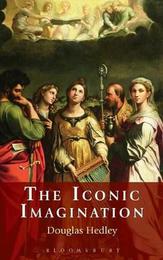
|
The Iconic Imagination
Hardback
Main Details
| Title |
The Iconic Imagination
|
| Authors and Contributors |
By (author) Professor Douglas Hedley
|
| Physical Properties |
| Format:Hardback | | Pages:320 | | Dimensions(mm): Height 229,Width 152 |
|
| Category/Genre | Philosophy - aesthetics
Philosophy of religion |
|---|
| ISBN/Barcode |
9781441172174
|
| Classifications | Dewey:128.3 |
|---|
| Audience | |
|---|
|
Publishing Details |
| Publisher |
Continuum Publishing Corporation
|
| Imprint |
Continuum Publishing Corporation
|
| Publication Date |
25 February 2016 |
| Publication Country |
United States
|
Description
Is it merely an accident of English etymology that 'imagination' is cognate with 'image'? Despite the iconoclasm shared to a greater or lesser extent by all Abrahamic faiths, theism tends to assert a link between beauty, goodness and truth, all of which are viewed as Divine attributes. Douglas Hedley argues that religious ideas can be presented in a sensory form, especially in aesthetic works. Drawing explicitly on a Platonic metaphysics of the image as a bearer of transcendence, The Iconic Imagination shows the singular capacity and power of images to represent the transcendent in the traditions of Christianity, Judaism, Hinduism and Islam. In opposition to cold abstraction and narrow asceticism, Hedley shows that the image furnishes a vision of the eternal through the visible and temporal.
Author Biography
Douglas Hedley is Reader in Hermeneutics and Metaphysics and Fellow of Clare College, University of Cambridge, UK. A past President of the European Society for the Philosophy of Religion, he is the author of Coleridge, Philosophy and Religion (2000), Sacrifice Imagined (2011) and Living Forms of the Imagination (2008).
ReviewsThe Iconic Imagination is a textured text. Reminiscent of George Steiner, Hedley weaves history, philosophy, theology, literature, psychology, and more throughout each chapter ... [It] holistically images various features of human life, and affirms vital academic interdisciplinarity ... The Iconic Imagination merits reading, reflection, argument, and rereading. * Reading Religion * The Iconic Imagination is a significant contribution to philosophical theology, generally, and, specifically, a contribution to the naturalism versus theism debates and the growing body of research on Cambridge Platonism. It is a delightful read and well worth your time. * Reviews in Religion & Theology * The Iconic Imagination is the final volume in what is really a three-volume treatise on the imagination, so for a complete picture of Hedley's philosophical and theological vision I highly recommend reading all three books in the trilogy. Each book, however, is conceptually independent enough from the others to be read alone. Taken as a whole, the trilogy is a monumental achievement. It is also a real pleasure to read. The book is of obvious value for scholars and students interested in the legacy and continuing relevance of Platonism, and the Romantic tradition, but I also highly recommend it for anyone interested in philosophy of religion, and theology. Because of the breadth of Hedley's learning, and his engaging style, I recommend it especially highly to graduate students as a model of scholarship in its field. * Philosophy in Review * The Iconic Imagination takes the reader through a wonderfully rich and varied array of literary and philosophical sources, ancient and modern, in order to explore the role of the imagination in Western thought and culture. In a fitting continuation of his earlier volumes on the religious imagination and on the imagery of the sacrificial, Douglas Hedley's highly erudite study provides fertile materials for grasping the metaphysical significance of the image as the bearer of transcendence. * John Cottingham, Professor Emeritus of Philosophy, University of Reading, UK, and Honorary Fellow, St John's College Oxford, UK * Of the various streams of intellectual influence that collectively compose our mental world, the Platonic and Romantic influences are among the least understood or appreciated. This book, which completes Hedley's magnificent, baroque, and profound tryptich on the imagination, is deeply informed by Romantic and Neoplatonic thinking, and will go a very long way to remedying our ignorance in this regard. To feast on its learning is to be nourished intellectually in ways you did not know you were famished; and to be informed by its allusive and visionary argument is to glimpse horizons of enquiry that you did not know were there. This work should have a major impact in philosophy, in theology, and in religious studies, and its influence on scholarly thinking about the human, the imagination, and religion will be felt for decades to come. * Charles Mathewes, Carolyn M. Barbour Professor of Religious Studies, University of Virginia, USA * [An] extraordinarily rich exploration of our image-making tendencies, understood as responses to a meaningful and value-laden world ... This is a book that constantly challenges us with reminders of possibilities for thinking beyond the narrow range of much recent philosophy and theology. Impressively learned but highly readable, it does not merely discuss the intellectual imagination, but stimulates it as well. * Religious Studies Review *
|